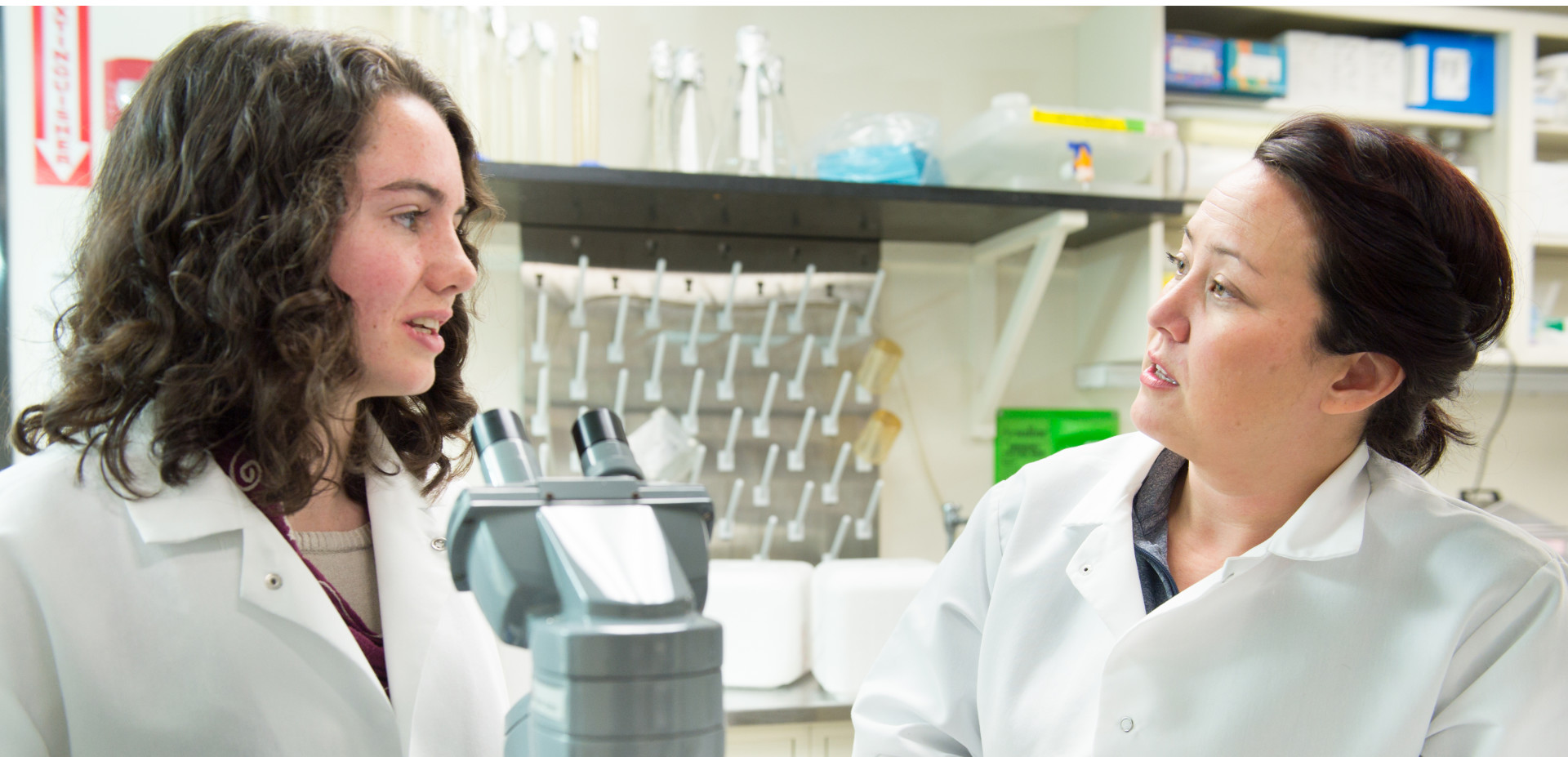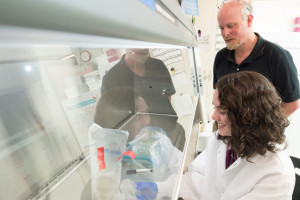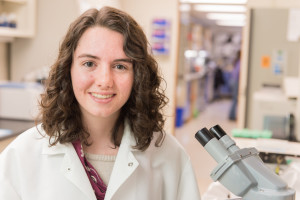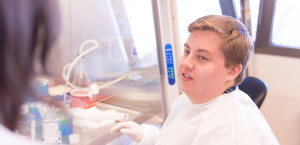
Cassidy Hagan talks about her tuberculosis research with Research Associate Lizzy Creissen in Angelo Izzo’s lab.
Finding the right lab to work in can be similar to finding the right person to date. You don’t always find the best match right away and it can be a frustrating process. But researchers in Colorado State University’s Department of Microbiology, Immunology and Pathology (MIP) hope to change all that with the Undergraduate Research Fellowship Program, designed to help young researchers find the scientific love of their lives.
“There’s some intimidation involved in finding the right lab,” explained Alan Schenkel, associate professor of immunology and director of the new program.

The aim of the research fellowship program is to help students get placed in labs earlier in their careers, so that they can find what could become a lifelong scientific pursuit.
“There’s a real value in providing undergraduate students with research experience, which offers skills that will directly transfer to post-graduate employment and further education,” said Sandra Quackenbush, associate dean of Academic and Student Affairs in the College of Veterinary Medicine and Biomedical Sciences. What’s equally and perhaps even more important is the mentoring that they receive in a close-knit laboratory environment, she added.
Undergrads manage their own research projects
Through the program, students majoring in microbiology get to choose their own research projects, so they’re not just washing glassware and assisting with prep for experiments (not that there’s anything wrong with that, Schenkel is quick to point out; it’s how many researchers get their start). And, thanks to the fellowship dollars, faculty have a small financial incentive, too, to support the effort.
“Science is not easy,” Schenkel said. “You repeat an experiment and it fails. But if a student really loves science, even when a research project fails, it motivates him or her to try again. It bothers them enough that they want to know the answer.”
The program’s first 12 students are hard at work in labs this semester. They ranked faculty based on their research interests, and a match was made. Support for the program stems from the Office of the Provost and the College of Veterinary Medicine and Biomedical Sciences.
New research fellows study TB, prions
Cassidy Hagan, a sophomore majoring in microbiology, is part of the program. She had already been working in the lab of Angelo Izzo, associate professor of mycobacterial immunology, and had managed one research project, examining the types of bacteria at different work stations. The Izzo lab conducts research on potential new vaccines for tuberculosis.

Now, thanks to the fellowship, Hagan said she will examine the the immune response induced by different vaccines, including BCG or bacille Calmette–Guérin, the current vaccine used for TB.
“BCG is the vaccine that is most effective against TB,” she said. “But BCG induces an immunity that is non-specific. It can help immune responses for many different types of infections. We’re trying to see how it does that, and which cell lines produce specific antibodies.”
Joseph Gallegos, a freshman who is pursuing a double major in microbiology and biological sciences, is also among the new research fellows.
“I’ve always been into science, it’s always something I’ve been good at and really interested in,” he said. He was matched with Glenn Telling’s laboratory, and is getting his feet wet — this is the first time he’s worked in a lab — in the realm of prion disease research. He hasn’t yet decided on a research project, but he’s up to speed on the subject matter.

“Prions are infectious proteins,” he said. “There’s a lot of research being done on classifying them and figuring out how they work. They’re really the newest, most recent discovery of an infectious disease type. We have bacteria and viruses, which we’ve known about for hundreds of years. Prions we’ve only known about over the last 100 years. There’s still a lot of work being done understanding them and how they work.”
Schenkel said that, ultimately, he hopes the fellowship will be a multi-year program. He is applying for a grant from the National Science Foundation that would support that vision.
“We’d like to see if the fellowship helps the students more readily find jobs or get accepted into graduate school,” he said. “We’re developing scientists, so those are the two main outcomes we’d like to see.”
Research, academic careers await
As a freshman, Gallegos said his career goals are up in the air. But he is already thinking about going to graduate school, which would lead to more research positions, and maybe even becoming a professor.
“That’s the primary thing I’m interested in, research and academia,” Gallegos said. “There are plenty of jobs that are available in this field. I could work in a brewery or work in a hospital.”
As for Hagan, she said she is pretty set on a career that would involve medical research. The inspiration is personal; her father has diabetes.
“I really like the idea that you can improve health for people,” she said. “If I can do that through scientific research, that’s what I’m most interested in.”
Undergraduates in this program are required to take MIP150, Introduction to Research Methods, before applying, and to present their research twice a year. There are also some grade requirements for students after they’ve participated in the program the first year.
Hagan is also involved in the Honors Undergraduate Research Scholars program, which is how she first started working for Izzo.
Erica Suchman, MIP associate department head and a University Distinguished Teaching Scholar, credits Quackenbush with launching the concept for the new fellowship program. Associate Professor Susan Deines also helped shape the program in its early stages, working with Suchman and Schenkel.
